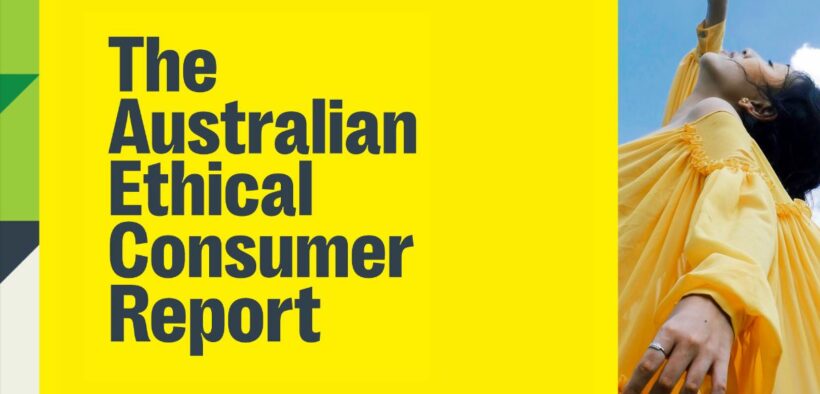Despite more Australians understanding the impact of their ethical fashion choices, cost-of-living pressures are making it difficult for Australians to put their values into action.
That’s according to a new report from Baptist World Aid Australia and Be Slavery Free. The Australian Ethical Consumer Report, is the second in-depth study of Australia’s ethical shopping attitudes and behaviours produced by McCrindle, with the first released in 2021.
Ethical awareness on the rise
The report revealed more Australians have become aware of the impact of their purchasing decisions over the last three years, this is up by 7% since the previous report in 2021.
Australians are also engaging with informative resources far more regularly with over two in five engaging with content relating to ethical consumption, compared to just one in ten in 2021.
The report found that 70% of Australians agree they want their shopping habits to reflect ethical practices over the next 12 months. Over half also agree it’s important to consider the environmental impact of their purchases and over a third of Australians are likely to research the environmental impact of a product before purchasing. These results are promising and reveal a unique opportunity for fashion brands to increase their ethical fashion offering to satisfy customer wants and needs.
The report revealed the top actions Australians are likely to take in the next year that focus on post-purchase behaviours include:
- Reducing the number of products they buy (52%).
- Researching how to responsibly dispose of something they no longer need (51%).
- Learning how to repair something they already own (50%).
Sarah Knop, National Engagement Manager at Baptist World Aid Australia highlighted that it was positive that more Australians were in tune with their ethical shopping impact on the eve of the peak shopping season, including online sales events Black Friday and Cyber Monday.
“This report shows that Australians are increasingly aware and care about the ethical practices of the brands they buy from,” said Knop.
“We’re pleased to see many aiming to reduce the impact of their wardrobes this year and invite them to buy differently, buy less and use their voice to help us put pressure on brands to do better for people and the planet.”
The study found a high level of awareness of the issue of modern slavery, with 80% having heard about situations of modern slavery before.
Almost half of Australians strongly or somewhat agree they’ve probably purchased products that have been made with modern slavery and 75% agree to an extent that their purchasing practices can make a difference in eradicating it.
“Awareness of modern slavery is on the increase amongst Australian consumers and they will demand ‘slavery-free’ products,” said Be Slavery Free Director Fuzz Kito.
Australians weigh up responsibility for change
While Australians are becoming more aware of the impact of their purchasing decisions, this isn’t always translating into action. Concerningly, the number of Australians who would like to change their shopping habits to align with ethical practices in the next 12 months has decreased by 17% since 2021.
Australians are this year prioritising value for money, quality and price as the top three influences on their purchasing decisions. The report also reveals that Australians are making purchasing decisions based on personal benefit (82%) rather than prioritising the impact of their purchase on others (18%).
With modern slavery rife in supply chains and the environment burdened by poor resource stewardship, it’s clear Australia has a long way to go to protect workers and the planet. While more Australians agree that they actively think about the impact of their purchases on others (39% compared to 32% in 2021); they believe governments and companies should be responsible for taking action on the eradication of forced labour, child labour, and ensuring a fair living wage.
Baptist World Aid Australia is calling on fashion brands to do better in strengthening access to ethical fashion options for consumers.
“Consumption has driven economic growth over the last century, but this growth has come with enormous social and environmental impacts,” said Knop.
“Consumers are increasingly spending their time, attention and resources to better understand the impact of their purchases but need the government and brands to make this process accessible to all.”
“Modern slavery is a system failure that requires system change to be meaningfully addressed,” said NSW Anti-slavery Commissioner Dr James Cockayne.
“Everyone has a part to play in the fight against modern slavery. Governments, businesses, civil society, survivors and consumers must work together to address modern slavery issues where they are identified.”
Dr Cockayne highlighted that through this collaboration they can bring about the system change that needs so our community can be slavery-free.
“It is very encouraging to see more and more of Australia’s younger consumers moving away from fast fashion,” said Australian Fashion Council CEO Leila Naja Hibri.
Seamless, Australia’s new national clothing product stewardship scheme, identifies changing citizen behaviour as one of its four critical priorities. The very best way to stop products being made unethically is for consumers to wield their power by choosing what they buy and who they buy it from.”
Baptist World Aid Australia and Be Slavery Free are committed to systemic change in global supply chains and supporting the endeavours of Australian consumers who want to shop more ethically. The Ethical Fashion Guide and Chocolate Scorecard are data-informed resources to support more ethical consumption of clothing, footwear and chocolate.
You can download “The Australian Ethical Consumer Report” here.


































































































































































